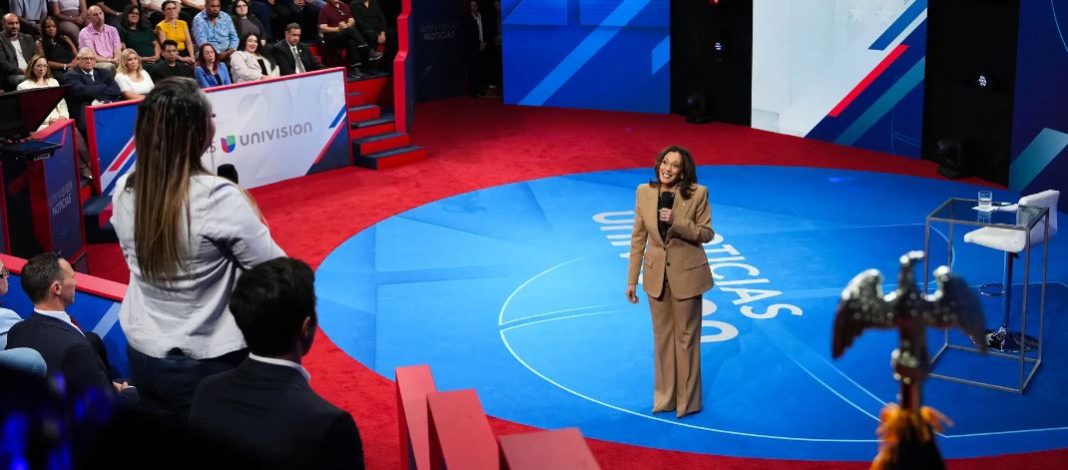At a recent Univision town hall in Las Vegas, Vice President Kamala Harris faced emotional and challenging questions from Hispanic voters, underscoring the high stakes of the upcoming election. Among the audience was Ivett Castillo, who spoke about her mother, who passed away without ever achieving legal status in the U.S. Castillo asked Harris what her administration would do to support long-term immigrants who live in the shadows.
In her response, Harris empathized with Castillo, urging her to “remember your mother as she lived.” She also acknowledged that the nation’s immigration system is “broken.” However, Harris shifted focus toward border security and criticized former President Donald Trump for blocking a bill that would have increased resources for border control. Her response highlighted the administration’s challenge of balancing enforcement with reform, as Trump continues to attack Harris on immigration issues.
The town hall, broadcasted in Spanish and English, targeted undecided Hispanic voters, a crucial demographic that could determine the outcome in swing states like Nevada and Arizona. While Harris emphasized her administration’s proposal to create pathways to citizenship for undocumented immigrants, she also stressed the need for stronger border policies. Her support among Hispanic voters has been weaker than President Biden’s in 2020, making this group key in the election.
Polling shows Harris trailing Trump among Hispanic voters in Arizona, with 49% support compared to Trump’s 41%, a notable decrease from Biden’s performance in 2020. In contrast, Harris holds a narrow lead in Nevada, a state where 1 in 5 voters are Hispanic. To address this, the Harris campaign has ramped up efforts to engage Latino voters through ads, outreach, and events in both English and Spanish. Harris hosted a get-out-the-vote rally in Phoenix, where she criticized Trump’s attempts to dismantle the Affordable Care Act and praised Senator John McCain’s crucial vote to preserve it.
Despite these efforts, Harris faces skepticism, particularly among Hispanic men. At the rally, Carmen Garza, a 49-year-old insurance worker, described the divide in her family. While her parents were staunch Democrats, her brother remains wary of Harris, believing his economic situation improved under Trump. Harris has launched targeted outreach to Hispanic men, including events under the banner “Hombres con Harris” (Men with Harris), focusing on health care and economic policies.
During the town hall, Harris underscored her personal story as the daughter of immigrants and reiterated her administration’s commitment to expanding legal pathways for undocumented immigrants, including Dreamers. However, she notably avoided discussing her past promise to use executive power to provide a pathway to citizenship for Dreamers, reflecting the political sensitivity of the issue.
Harris’s appearance at the Univision town hall was significant, given the importance of Hispanic voters in states like Arizona and Nevada. According to pollster Mike Noble, Hispanic voters are the largest swing group in these states and could be decisive in the election. In Arizona, top issues for Latino voters are the economy and immigration, while in Nevada, the focus includes the economy, abortion rights, and service industry wages.
Trump, who is set to appear in his own Univision town hall on October 16, remains a polarizing figure among Hispanic voters. Harris took several opportunities to criticize Trump during her appearance, calling him a “sore loser” who incited violence against Congress and threatened to be a “dictator on Day 1” if re-elected. She emphasized the stakes of the election, framing it as a choice between democracy and authoritarianism.
While Harris received applause for her criticism of Trump, she faced a difficult moment when asked to name three virtues of the former president. Struggling to answer, she eventually cited his love for his family but admitted she had little else to say, having only met him once.
As the election approaches, both Harris and Trump are courting Hispanic voters in critical states. With tight margins in key battlegrounds, the influence of Latino voters could determine the outcome. Harris’s campaign continues to focus on policies aimed at supporting small businesses, lowering costs for families, and creating more legal pathways for immigrants, all while navigating the complex political landscape of immigration and border security.

